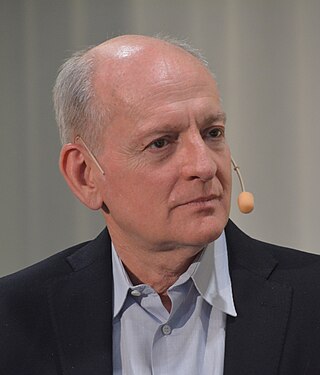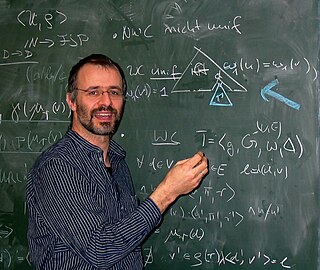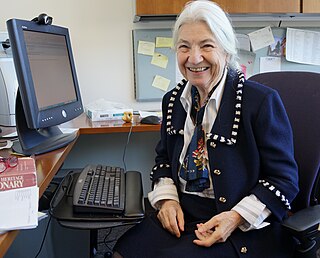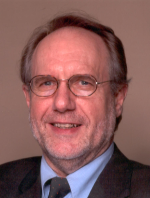
Peter Norvig is an American computer scientist and Distinguished Education Fellow at the Stanford Institute for Human-Centered AI. He previously served as a director of research and search quality at Google. Norvig is the co-author with Stuart J. Russell of the most popular textbook in the field of AI: Artificial Intelligence: A Modern Approach used in more than 1,500 universities in 135 countries.

Stuart Jonathan Russell is a British computer scientist known for his contributions to artificial intelligence (AI). He is a professor of computer science at the University of California, Berkeley and was from 2008 to 2011 an adjunct professor of neurological surgery at the University of California, San Francisco. He holds the Smith-Zadeh Chair in Engineering at University of California, Berkeley. He founded and leads the Center for Human-Compatible Artificial Intelligence (CHAI) at UC Berkeley. Russell is the co-author with Peter Norvig of the authoritative textbook of the field of AI: Artificial Intelligence: A Modern Approach used in more than 1,500 universities in 135 countries.

Sebastian Thrun is a German-American entrepreneur, educator, and computer scientist. He is CEO of Kitty Hawk Corporation, and chairman and co-founder of Udacity. Before that, he was a Google VP and Fellow, a Professor of Computer Science at Stanford University, and before that at Carnegie Mellon University. At Google, he founded Google X and Google's self-driving car team. He is also an adjunct professor at Stanford University and at Georgia Tech.
Seymour Ginsburg was an American pioneer of automata theory, formal language theory, and database theory, in particular; and computer science, in general. His work was influential in distinguishing theoretical Computer Science from the disciplines of Mathematics and Electrical Engineering.
Alan Mackworth is a professor emeritus in the Department of Computer Science at the University of British Columbia. He is known as "The Founding Father" of RoboCup. He is a former president of the Association for the Advancement of Artificial Intelligence (AAAI) and former Canada Research Chair in Artificial Intelligence from 2001 - 2014.

Wolfram Burgard is a German roboticist. He is a full professor at the Albert-Ludwigs-Universität Freiburg where he heads the Laboratory for Autonomous Intelligent Systems. He is known for his substantial contributions to the simultaneous localization and mapping (SLAM) problem as well as diverse other contributions to robotics.

Michael Kohlhase is a German computer scientist and professor at University of Erlangen–Nuremberg, where he is head of the KWARC research group.

Michael Lederman Littman is a computer scientist, researcher, educator, and author. His research interests focus on reinforcement learning. He is currently a University Professor of Computer Science at Brown University, where he has taught since 2012.

Dieter Fox is a German-American roboticist and a Professor in the Department of Computer Science & Engineering at the University of Washington, Seattle. He received his PhD in Computer Science at the University of Bonn in 1998. He is most notable for his contributions to several fields including robotics, artificial intelligence, machine learning, and ubiquitous computing. Together with Wolfram Burgard and Sebastian Thrun he is a co-author of the book Probabilistic Robotics.

Manuela Maria Veloso is the Head of J.P. Morgan AI Research & Herbert A. Simon University Professor in the School of Computer Science at Carnegie Mellon University, where she was previously Head of the Machine Learning Department. She served as president of Association for the Advancement of Artificial Intelligence (AAAI) until 2014, and the co-founder and a Past President of the RoboCup Federation. She is a fellow of AAAI, Institute of Electrical and Electronics Engineers (IEEE), American Association for the Advancement of Science (AAAS), and Association for Computing Machinery (ACM). She is an international expert in artificial intelligence and robotics.

Leonhard Wolfgang Bibel is a German computer scientist, mathematician and Professor emeritus at the Department of Computer Science of the Technische Universität Darmstadt. He was one of the founders of the research area of artificial intelligence in Germany and Europe and has been named as one of the ten most important researchers in the German artificial intelligence history by the Gesellschaft für Informatik. Bibel established the necessary institutions, conferences and scientific journals and promoted the necessary research programs to establish the field of artificial intelligence.

Ruzena Bajcsy is an American engineer and computer scientist who specializes in robotics. She is professor of electrical engineering and computer sciences at the University of California, Berkeley, where she is also director emerita of CITRIS.

Toby Walsh is Chief Scientist at UNSW.ai, the AI Institute of UNSW Sydney. He is a Laureate fellow, and professor of artificial intelligence in the UNSW School of Computer Science and Engineering at the University of New South Wales and Data61. He has served as Scientific Director of NICTA, Australia's centre of excellence for ICT research. He is noted for his work in artificial intelligence, especially in the areas of social choice, constraint programming and propositional satisfiability. He has served on the Executive Council on the Association for the Advancement of Artificial Intelligence.
Tom Michael Mitchell is an American computer scientist and the Founders University Professor at Carnegie Mellon University (CMU). He is a founder and former Chair of the Machine Learning Department at CMU. Mitchell is known for his contributions to the advancement of machine learning, artificial intelligence, and cognitive neuroscience and is the author of the textbook Machine Learning. He is a member of the United States National Academy of Engineering since 2010. He is also a Fellow of the American Academy of Arts and Sciences, the American Association for the Advancement of Science and a Fellow and past President of the Association for the Advancement of Artificial Intelligence. In October 2018, Mitchell was appointed as the Interim Dean of the School of Computer Science at Carnegie Mellon.
Benjamin Kuipers is an American computer scientist at the University of Michigan, known for his research in qualitative simulation.

Peter Stone is an American computer scientist who is the David Bruton Jr. Centennial Professor of Computer Science at the University of Texas at Austin. He is also an Alfred P. Sloan Research Fellow, Guggenheim Fellow, AAAI Fellow, and Fulbright Scholar.
Thomas Nathaniel Hibbard was an American mathematician and computer scientist.
Kristian Kersting is a German computer scientist. He is Professor of Artificial intelligence and Machine Learning at the Department of Computer Science at the Technische Universität Darmstadt, Head of the Artificial Intelligence and Machine Learning Lab (AIML) and Co-Director of hessian.AI, the Hessian Center of Artificial Intelligence.

The Department of Computer Science is a department of the Technische Universität Darmstadt. With a total of 36 professorships and about 3,700 students in 12 study courses, the Department of Computer Science is the largest department of the university. The department shapes the two research profile areas "Cybersecurity (CYSEC)" and "Internet and Digitization (InDi)" of the university.
Daniel Cremers is a German computer scientist, Professor of Informatics and Mathematics and Chair of Computer Vision & Artificial Intelligence at the Technische Universität München. His research foci are computer vision, mathematical image, partial differential equations, convex and combinatorial optimization, machine learning and statistical inference.













